Burial "in repnoe" or Why in Russia it was customary to bury the dead immediately
Categories: History
By Pictolic https://pictolic.com/article/burial-in-repnoe-or-why-in-russia-it-was-customary-to-bury-the-dead-immediately.htmlFor residents of Russia turnips have always been valuable not only culture, but also a plant that has a sacred meaning. Part of it is the root that was under the earth and thus belonged to the world of the dead, and the part is "inches", belonged to the world of the living. Strange and creepy way of the funeral of the deceased a violent death, in Russian called "in repnoe" it is because of this particular root.
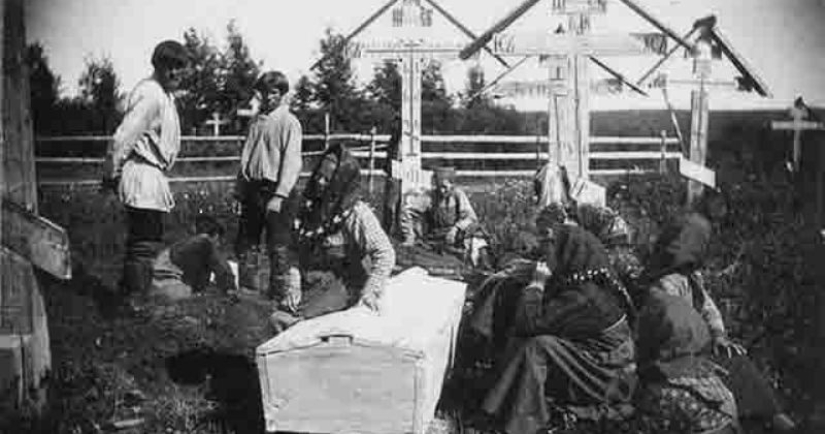
Turnips in Russian villages has always been associated with the world of the dead. Dishes she prepared for a symbolic funeral at Christmas, she was always on the table at the funeral, and it also "treated" to the dead in commemoration days.
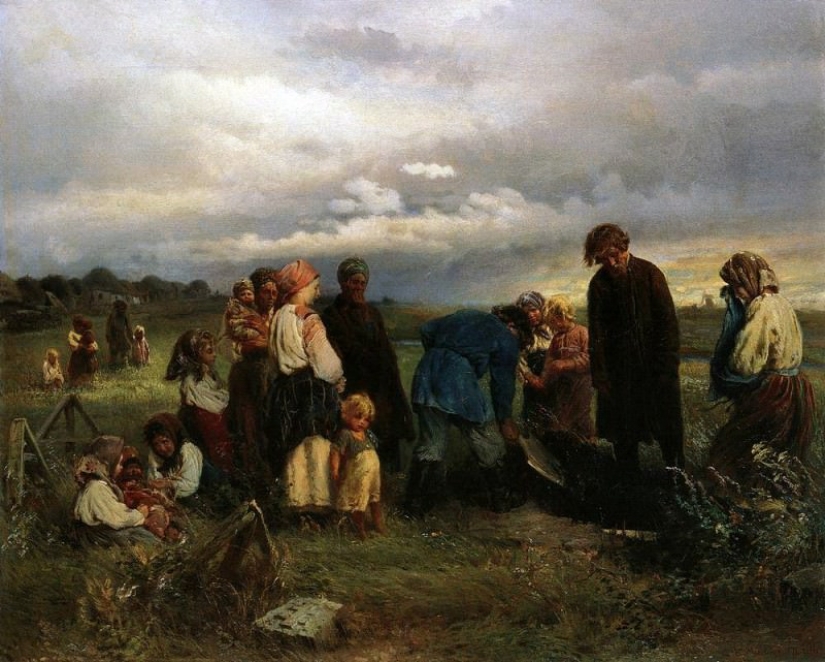
After harvesting turnip very often "buried" — at the time buried in the ground to extract and transfer to the cellars and the underground to the onset of the first frost. "The funeral for turnip" — custom temporary burial or storing the body of the deceased during a certain time as this not to sound cynical, was very similar to the manipulation of turnips.
Historian Julia A. Krasheninnikov, who has studied funeral rites of the peoples of Russia, in his article on "white funeral" writes that in some villages in the Komi Republic is a strange way of dealing with the dead was practiced even in the 1920s.
"In repnoe" usually buried those who were killed or died of another unnatural death, drowned, killed at work, a frozen or stuck animal. The dead body is washed, dressed in new clothes, and laid in the coffin.
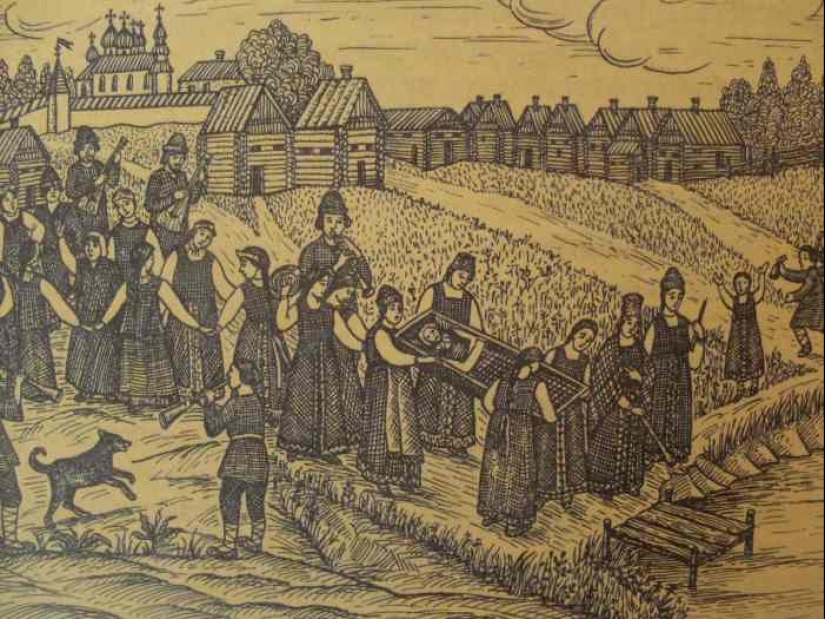
Near the house were dug grave, where was placed the body in an open coffin, isn't covered. The grave was dug, and there was set the clock duty. After a while the coffin was removed from the pit and buried the dead on a regular graveyard.
It so happened that the coffin with the body was lowered into the ground, but on the contrary, "hung", it is put on the box or posts which were called "fires". Preserved the memories of witnesses who have found such a funeral and could tell interesting details.
A resident of the village Kozlovskaya, Zinaida Pominova born in 1909, at the age of ten were present in repnoe the funeral of his grandfather. The man was killed in the logging tree in the winter. Open coffin with a dead man mounted on goats in the yard, and so kept till spring, and then buried in a common grave.
Pominova told that all the time until the coffin with his grandfather stood near the house, beside him, took turns watching the men, leaving the dead man alone for a minute. The woman believed that by burying the deceased did not allow the authorities that the death of the trees seemed odd, but if it was linked to the investigation, now don't tell anybody.
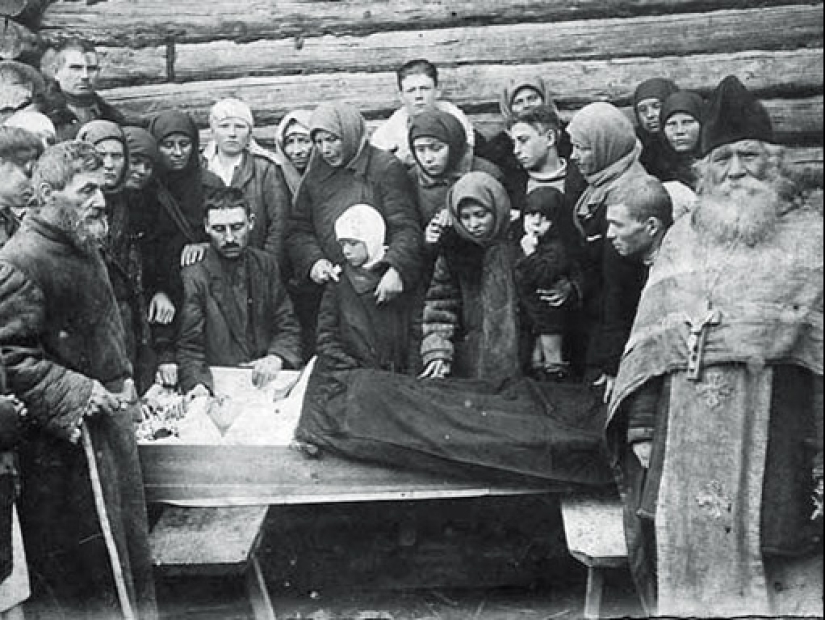
There is information that in 1916 in the same village were buried according to the ancient custom of the murdered in the woods of unknown men. The coffin was put on a box in the house and he stood there for 10 days. After that the dead man was the burial service in the Church and carried to the cemetery.
Similarly, they buried the old man on the road and killed the robbers to take his horse. The body of the robbers dropped into the ravine, and it snowed. Therefore, a murder victim found immediately, but only in the spring, when from under the snow seemed to hand.
The victim of the robbery was buried "in white", by placing the coffin in a shallow open grave near the house. Relatives and neighbors held a vigil for the dead for two people for two weeks, followed by a full funeral in the cemetery.
In rare cases, a "white" buried in the 30‑ies of the last century. Anna Vasilievna Beznosikov born in 1922 in the village of Fumes, told the anthropologists that saw her fellow villagers kept in an open grave in the garden the body of a drowned man. Through time it was the funeral and carried to the cemetery, but it does not skid.
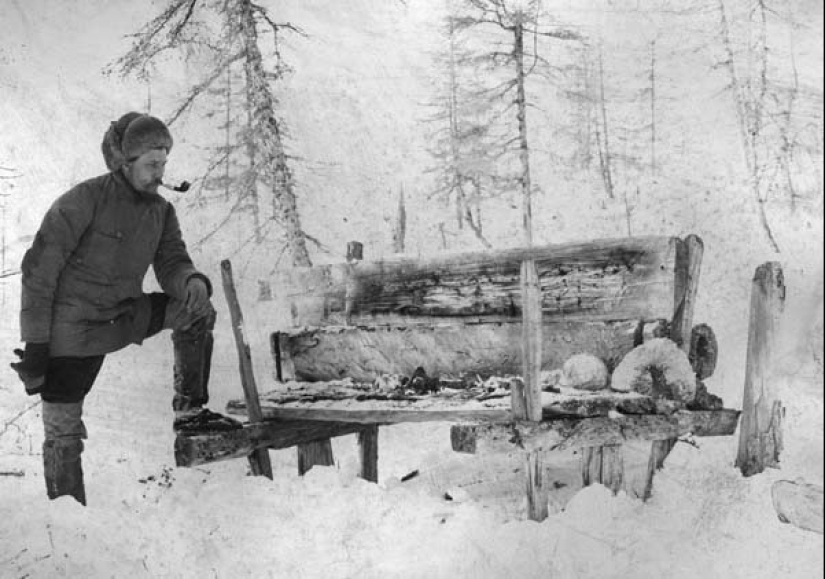
Preserved information that sometimes the dead were buried "in repnoe" right where they died. Even if the place was at a considerable distance from the housing, the coffin will certainly arranged a post of two.
Anthropologists and historians believe that the tradition to bury "in repnoe" many hundreds of years, and it appeared long before the arrival of Christianity. It is believed that the pagans were buried so unknown to the dead, as well as those who died a sudden or strange death.
These corpses were called "salonami" and it was believed that they lived on earth. So the land could not accept the deceased, which becomes in this case a ghoul and begin to create problems alive.
To avoid this, the body was carried away in the jungle forest and covered with branches and stones directly on the surface. "Zaloznykh" dead men were very afraid and to the places where they were, tried to stay away.
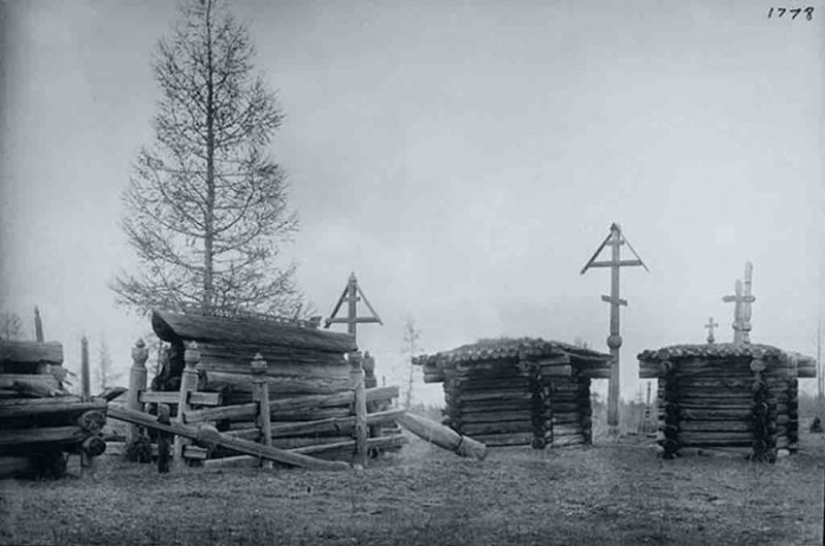
From the dead the living world was protected by special zagovornye grooves, various amulets and spells. Leaving the body in the woods, returning home by confusing to the dead "prevent".
"Zaloznykh" the dead were not only afraid of the fact that they could come to life and come to people. It was believed that this restless dead could cause prolonged rains or, on the contrary, drought, harmful to the crop. Of course, the official Orthodox Church did not approve of this method of funeral, but in the villages the priests belonged to the tradition properly.
For the first time the custom of the people of Rus ' to bury temporarily described by the Arab traveler Ibn Fadlan in the 9th century. He said that he saw on the banks of the Volga, have buried the leader of one of the tribes who was killed in battle. Man buried shallowly in the ground for 10 days and all this time preparing for this funeral.
The leader made new expensive clothes and made a special funerary boat. When all was ready, the corpse dug up, putting, put in the ship with different weapons and utensils, and then burned.
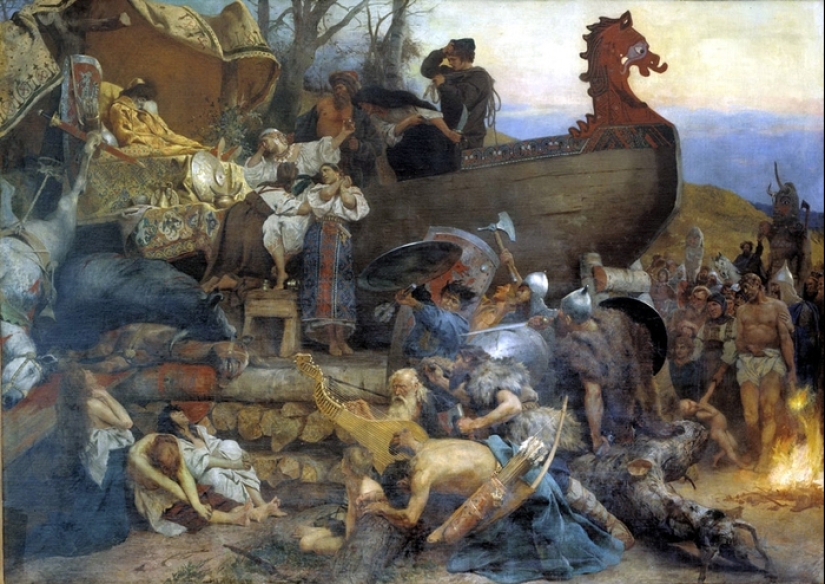
Longest pagan tradition repnoe funeral preserved in the territory of the Komi Republic in the Russian villages. Scientists believe that this is due to the isolation of these places and the fact that the Orthodox community was surrounded on all sides by the Gentiles Komi Republic, with their pagan beliefs and specific mythology.
In contrast to the pagan period, in Orthodox villages is not removed from the housing of the dead, and kept them near the house. The tradition has evolved, and it was believed that such a funeral are intended to protect the dead from the living, but rather to facilitate the transition to another world, to feel some time alive, to "communicate" with the family.
The company, which was buried temporarily, could be different, and it all depended on the circumstances. Most of the dead were kept near the house 10 days, but if the expected arrival for the funeral of relatives or the permission of the authorities, then it could take several weeks.
Keywords: Death | The Russian Federation | History | Woods | Ceremony | Cemetery | Grave | Ancient Russia
Post News ArticleRecent articles

It's high time to admit that this whole hipster idea has gone too far. The concept has become so popular that even restaurants have ...

There is a perception that people only use 10% of their brain potential. But the heroes of our review, apparently, found a way to ...
Related articles

Immunity to poisons at all times been the dream of all authority. List of popes, kings and emperors, gave his soul to God through ...

In the fall of 1972, Bill Yates traveled through the countryside in the vicinity of Tampa, Florida. At that time, he was studying ...

When a person is in a life-threatening situation is awful, but even worse when it happens to a child. 11-year-old American Terry ...

New Year's is a time to surprise and delight loved ones not only with gifts but also with a unique presentation of the holiday ...